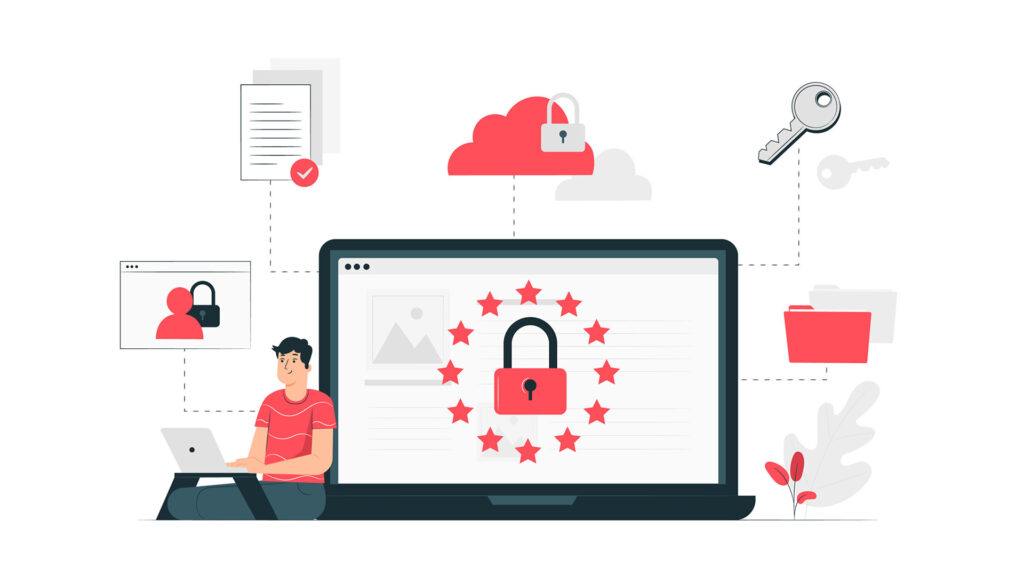We are living in an interconnected world where data is considered king. We all know that brands collect data for running personalized campaigns and marketing purposes. Even though it is vital for business, the problem arises when the security and privacy of the collected data aren’t ensured. How does data privacy in digital marketing affect businesses and consumers in the long run? Let’s discuss and understand the concepts of what is data privacy in this article.

Understanding What is Data Privacy in Digital Marketing
Once you search what is data privacy, you’ll be bombarded with a ton of definitions on the web, each with its variations. However, let’s keep things simple here. Data privacy is about controlling who gets to see the information and what they can do with it. In other words, it is the correct way to handle, store, and use customer information.
When it comes to data in digital marketing, this includes names, emails, phone numbers, location data, web browsing history, payment credentials, etc. The objective of data privacy is to safeguard the authenticity of client data and be transparent about how they collect process, and store this information.
Why is data privacy important in digital marketing? In any business that involves data collection, ensuring data privacy is of utmost importance and how the brand handles it can drastically affect its long-term success. In fact, before collecting any sort of data, the brand must obtain consent from the customer and also comply with data privacy regulations, such as the General Data Protection Regulation (GDPR), Personal Data Protection Law (PDPL) in the UAE, etc. Implementing data privacy in digital marketing presents you with the following set of advantages.
Protection Against Data Breaches
Data breach incidents, depending upon the severity, can be a massive blow to businesses and customers. With so many data breaches happening worldwide including this recent one at Lulu Mall, UAE it only makes sense to prioritize them. When brands start to focus on data privacy by strengthening security measures, the risk can be minimized to a great extent and restore trust.
Helps Builds Trust
Want to earn customers’ trust quickly? respecting their privacy and the information they share with your brand. If there isn’t a trust factor between you and your customers, nothing else matters, even your quality services. Audiences that trust a company to protect their data are more likely to share it with them.
Following the ethical standards
If you think data privacy is all about legality, it’s also about following ethics. As a business, if you are collecting data from customers, it’s your job to be transparent about data collection and ensure that they are used for legitimate purposes only.
Improved data accuracy
As mentioned above, brands have to be transparent about the data collection process. So, if you want to make better business decisions, your customers need to know what kind of data is being collected and how it will be used. This results in them providing accurate information. You can then analyze this data using an Excel alternative that suits your business needs and will streamline your data management processes effectively.
Competitor Differentiation
In the competitive business landscape, ensuring data privacy is a key differentiator for brands. As customers are more likely to choose businesses that protect their data, prioritizing data privacy in digital marketing helps businesses stand out from the competition.
What Is Data Security And Privacy?: Same Same But Different
These two terms are often mixed up and are used interchangeably by some people. Even though both have similar functions in dealing with data, they aren’t the same. So, if you ask what is data security and privacy, the former protects the information from unauthorized access, tampering, etc. The latter controls who should see the customer data. Despite the difference, both are equally important for businesses as they help minimize the impact of data breaches, information theft, data misuse, etc.
Most countries have data privacy laws in place and every brand must adhere to them when collecting data. Failure to uphold these policies can result in hefty fines and lawsuits which isn’t something exciting to obtain. In a nutshell, rather than focusing on either one, every brand must have both of them implemented to ensure the complete protection and handling of the data collected. To understand more about them in detail, consulting with a reputed firm offering top digital marketing services in Dubai is a wise choice.
Prioritizing Data Privacy in Digital Marketing
There are multiple types of digital marketing campaigns and data is an essential tool in creating those campaigns but with various data breach incidents reported periodically, it’s important to take action and safeguard customer data. Brands need to prioritize data privacy in their strategies which will help build trust and increase brand reputation. Now that you have learned why is data privacy important in digital marketing, let’s discuss the steps that can be taken to ensure the data collected from customers is safe from unauthorized means.
Leverage Secure Technologies
As technologies are getting more secure and smarter, brands and businesses must utilize them to protect data and control access. Some of these technologies include secure servers, two-factor authentication, encryption, firewalls intrusion detection systems, etc. Additionally, a decentralized VPN can offer enhanced privacy and security by distributing the VPN network across multiple nodes, reducing vulnerabilities and ensuring safer data transmission. Apart from implementing them, the systems must be regularly checked to identify potential vulnerabilities.
Incorporate Data Protection Policies
Data privacy starts by implementing robust data protection policies. This should outline various parameters such as how the data is collected, how they are used, who can access it, etc. The data protection policies must be communicated with the customers and must be reviewed from time to time to ensure they adhere to the latest data regulation laws and standards.
Obtain Consent Then Collect
Customers have the right to know why their data is being collected. Before collecting data, brands must obtain consent from customers and inform them of what data is being collected and how it will be used for marketing purposes.
Only necessary data relevant to the products or services must be collected from customers and collecting without consent is a direct violation of user rights and can result in legal troubles. What’s more, brands must provide customers with the option to opt out of data collection if they aren’t well with that.
Winding up
Why is data privacy important in digital marketing? consumers are becoming more aware of their data privacy rights and are more selective about choosing trusting brands that protect their data. This is something all brands must understand and should take steps to ensure data privacy. This involves being transparent to customers, complying with respective data regulations, implementing protective measures to safeguard customer data, collecting data that is necessary, offering data deletion options and so on. Prioritizing data privacy helps businesses differentiate themselves and build stronger customer relationships.
Related Post
Publications, Insights & News from GTECH








